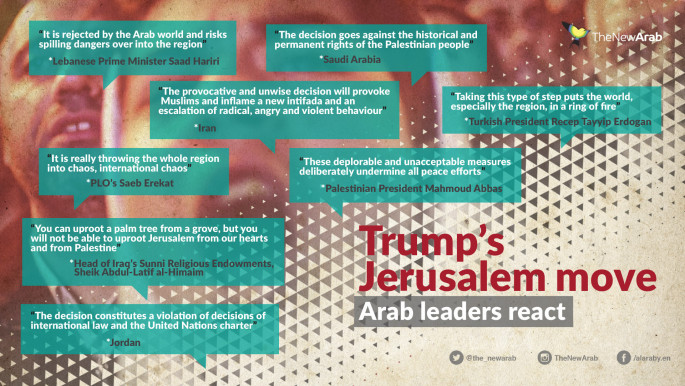Israeli soldiers attack Palestinians protesting Trump's Jerusalem embassy move
Trump caused outrage and concern after dismissing warnings from Arab leaders, European allies and even the Pope by announcing the US' recognition of Jerusalem as Israel's capital on Wednesday.
The demonstrators were seen burning posters of Trump and of Israeli Prime Minister Binyamin Netanyahu, as well as American and Israeli flags in response to what they refer to as an act of war and the end of the peace process.
Clashes between Israeli security forces and Palestinian civilians were reported at several locations.
Rallies were underway on Thursday in the West Bank cities of Hebron, Ramallah, Nablus, Jenin and Bethlehem. A demonstration was also being held outside the Damascus Gate of Jerusalem's Old City.
Israeli forces assaulted several hundred protesters with tear gas at a checkpoint at the entrance to Ramallah, while the Palestinian Red Crescent reported dozens wounded from tear gas, rubber bullets and live fire in the West Bank.
Three Palestinians were wounded east of the city of Khan Yunis in the Gaza Strip, medical sources and witnesses said.
Hamas leader Ismail Haniya has called for a new Palestinian uprising in retaliation to Trump's move. In a speech on Thursday, Haniya's address to "the Palestinian people, the Palestinian Authority and the rest of the Arab World" announced the start of a new intifada, due to begin on Friday.
"This intifada will be called the Intifada of the Stone," the leader of the Palestinian movement said, urging that it begins on Friday, a holy day for Muslims.
He described Trump's decision as an "aggression on our people and a war on our safety."
Trump's move ends seven decades of US ambiguity on the status of the Holy City, which is vociferously claimed by both Israelis and Palestinians, and his decision immediately caused a stir with US allies who condemned the move.
 |
|
Saudi Arabia blasted the move as "unjustified and irresponsible", and said it goes against the "historical and permanent rights of the Palestinian people."
Through gritted teeth, Britain described the move as "unhelpful" and France called it "regrettable." Germany said plainly that it "does not support" Trump's decision.
Eight countries including Britain, France and Italy pressed for an emergency meeting of the UN Security Council in response to the move, which was set for Friday.
The leaders of Muslim nations meanwhile deployed ever-harsher rhetoric to describe Trump's decision.
Turkey and Iran, both vying for regional influence, tried to give voice to the anger felt by many across the Muslim world.
Ankara called the decision "irresponsible" and illegal. Tehran said it would "provoke Muslims and inflame a new intifada."
Trump's predecessors, from Bill Clinton to George Bush, had made the same promise, but quickly reneged upon taking office. But the 45th US president was determined to show his arrival in Washington spells the end of business as usual, suggesting his predecessors failed to act through lack of "courage."
Moving the embassy will probably take years to implement, but the repercussions of Trump's decision preceded even his announcement.
Agencies contributed to this report


